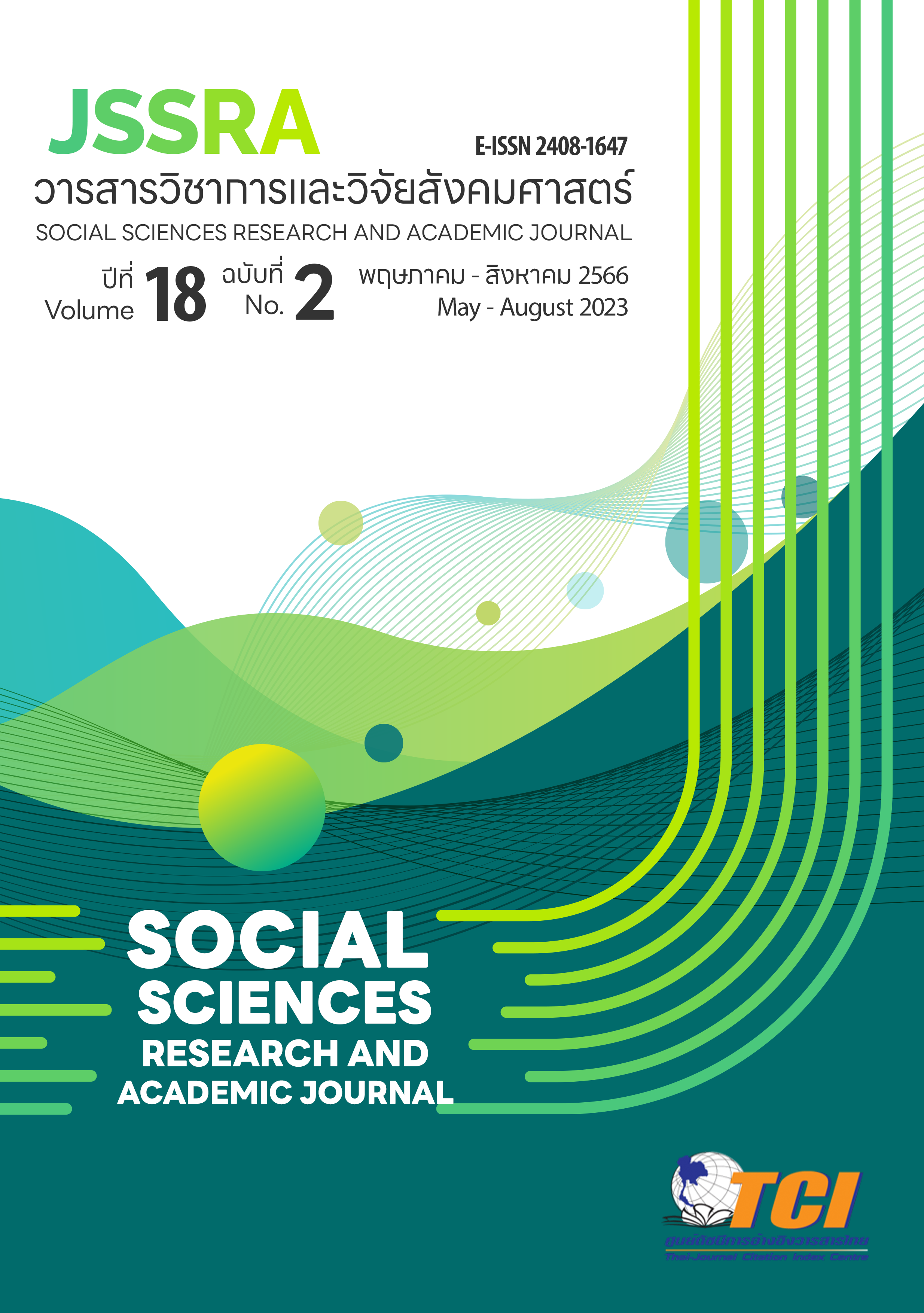การพัฒนาเว็บฝึกอบรมการจัดการเรียนรู้วิชาวิทยาการคำนวณตามแนวคิด TPACK สำหรับครู สังกัดสำนักงานเขตพื้นที่การศึกษาประถมศึกษาชัยนาท The Development of Web Based Training for Learning Management of Computing Science Based on TPACK Concept for Teachers Under Chainat Primary Educational Service Area Office
Main Article Content
Abstract
The objectives of this research were 1) to develop Web Based Training for learning management in Computing Science based on TPACK concept for teachers, 2) to study the results of using Web Based Training for learning management in Computing Science based on TPACK concept for teachers in Technological Knowledge, 3) to study the results of Web Based Training for learning management in Computing Science based on TPACK concept for teachers in in Pedagogical Knowledge, and 4) to study the results of using Web Based Training for learning management in Computing Science based on TPACK concept for teachers in Content Knowledge. The samples in this research were teachers who teach the core area 4.2 Technology (Computing Science) at the primary 1 - 6 level, Academic Year of 2021 and work under the Chainat Primary Educational Service Area Office which did not graduate directly in the Computer major of 45 people. This research has passed the Human Research Ethics Certificate No HE-049-2565. The tools used in the research were Web Based Training and assessment form of knowledge-based learning process combined with Pedagogical Knowledge with Technological Knowledge (TPACK) (Tae S. Shin et al., 2009). The statistics used in the data analysis were Mean, Standard Deviation, t-test dependent.
The results of this research found that 1) The results of the development of Web Based Training for learning management in Computing Science based on TPACK concept for teachers at a very reasonable level. In terms of time the performance test of web visual content and visual language has good applicability in web display design. 2) The results of teachers Technological Knowledge found that Teachers gain more technical knowledge and understand the use of new technologies in teaching management. 3) The results of teachers Pedagogical Knowledge found that Teachers can adjust teaching and action methods to help students understand, while students do not understand the use of different technologies. More teaching management. 4) The result of teacher Content Knowledge found that Teachers have a good understanding of the subjects they teach as well as the facts theories and processes in the course of technology (Computing Science).
Article Details
References
จันทมณี สระทองหน และ จรินทร อุ่มไกร. (2560). การจัดการเรียนการสอนในศตวรรษที่ 21 แบบ TPACK MODEL โดยการใช้การสอนแบบเสมือนจริง. มหาวิทยาลัยราชภัฏนครปฐม.
ณัฐกานต์ เทพบำรุง และ จรินทร อุ่มไกร. (2561). การจัดการเรียนรู้แบบ TPACK MODEL ด้วยเทคนิคความเป็นจริงเสริมสามมิติ ในรายวิชาวิทยาศาสตร์ สำหรับนักเรียนชั้นมัธยมศึกษาปีที่ 1 กรณีศึกษาโรงเรียนบ้านตรอกสะเดา. มหาวิทยาลัยราชภัฏนครปฐม.
พนารี สายพัฒนะ. (2551). การฝึกอบรมผ่านเว็บ (Web-based Training : WBT). สืบค้นเมื่อ 11 กรกฎาคม 2564. จาก http://social.chan.rmutto.ac.th/edtechpark/RidArealpanaree.doc.
ลิลลา อดุลยศาสน์. (2561). ผลของการพัฒนาความรู้ในการบูรณาการเทคโนโลยีกับวิธีสอนและเนื้อหาที่สอน (TPACK) ของนักศึกษาครูสาขาวิชาคณิตศาสตร์ที่มีต่อผลสัมฤทธิ์ทางการเรียน คณิตศาสตร์ของนักเรียน. มหาวิทยาลัยราชภัฏยะลา, ยะลา.
สถาบันส่งเสริมการสอนวิทยาศาสตร์และเทคโนโลยี กระทรวงศึกษาธิการ. (2561). หนังสือเรียนรายวิชาพื้นฐานวิทยาศาสตร์ชั้นประถมศึกษาปีที่ 4 กลุ่มสาระการเรียนรู้วิทยาศาสตร์. กรุงเทพฯ: องค์การค้าของ สกสค.
สมใจ สืบเสาะและพัลภ พิริยะสุรวงศ์. (2556). การพัฒนารูปแบบการเรียนแบบสร้างสรรค์เชิงหรรษาบนเว็บ เพื่อส่งเสริมความคิดสร้างสรรค์ สำหรับนักศึกษาระดับปริญญาบัณฑิต. วารสารวิทยบริการ, สำนักวิทยบริการ, มหาวิทยาลัยสงขลานครินทร์ วิทยาเขตปัตตานี.
สำนักงานคณะกรรมการการศึกษาขั้นพื้นฐาน. (2556). แนวทางการนิเทศเต็มพิกัด. กรุงเทพฯ: สํานักพิมพ์คณะรัฐมนตรีและราชกิจจานุเบกษา.
สำนักงานเขตพื้นที่การศึกษาประถมศึกษาชัยนาท. (2564). ทะเบียนโรงเรียนสังกัดสำนักงานเขตพื้นที่การศึกษาประถมศึกษาชัยนาท ภาคเรียนที่ 2 ปีการศึกษา 2564. ชัยนาท.
Denise A. Schmidt, Evrim Baran, Ann D. Thompson, Punya Mishra, Matthew J. Koehler & Tae S. Shin. (2009). Technological pedagogical content knowledge (Track): The development and validation of an assessment instrument for preservice teachers. Journal of Research on Technology in Education.
Driscoll M. (2002). Web-BASED TRAINING. San Francisco: Jossey–Bass/Pfeiffer.
Kay, K. & Greenhill, V. (2011). Twenty-first century students need 21st century skills. In Wan, G (Ed), Binging schools into the 21st century (pp. 41-66). New York: Springer Dordrecht Heidelberg.
Koehler, M. J. (2016). Technological Pedagogical Content Knowledge (TPACK). Retrieved December 28, 2020, from: http://www.tpack.org/.
Koehler, M. J. & Mishra, P. (2009). What is technological pedagogical content knowledge (TPACK). Contemporary Issues in Technology and Teacher Education (CITE Journal).
Mishra, P. & Koehler, M. J. (2006). Technological pedagogical content knowledge: A framework for teacher Knowledge. The Teachers College Record, 108(6), 1017-1054.
Mishra, P. & Koehler, M. J. (2008). Introducing technological pedagogical content knowledge. Paper presented at the In Annual Meeting of the American Educational research Association, New York.
Mishra, P. & Koehler, M. J. (2009). Too Cool for School No Way! Using the TPACK Framework: You Can Have Your Hot Tools and Teach with Them, Too. Learning & Leading with Technology, 36(7), 14-18.
Partnership for 21st Century Skills. (2007). FRAMEWORK FOR 21ST CENTURY LEARNING. Retrieved July, 24, 2021, from: http://www.p21.org/storage/documents/1.__ p21_ framework_2-pager.pdf.
Shulman, L, S. (1986). Those who understand: knowledge growth in Teaching. Educational researcher, 4-14.


